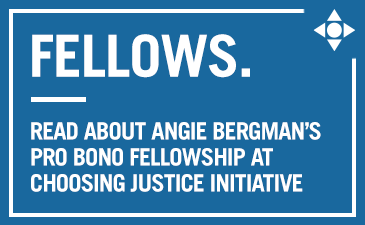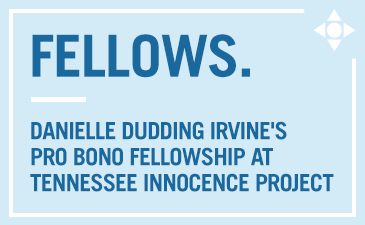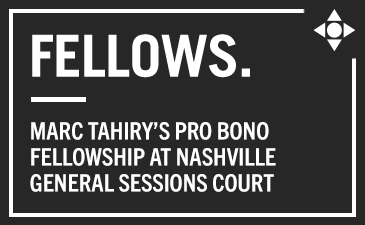As part of its longstanding commitment to pro bono work with systemic impact, in April 2019, the firm established the Pro Bono Fellow program, which allows attorneys to be paid their full compensation and benefits while working for up to six months full-time in a pro bono capacity within the community. To date, the firm has sponsored a Fellow in Nashville with Choosing Justice Initiative, a Fellow in Memphis with Tennessee Innocence Project, and a Fellow with the Nashville General Sessions Court.
 With Choosing Justice Initiative, Angie Bergman worked with multiple stakeholders litigating issues relating to money bail in Davidson County and filing a federal court, pre-trial habeas corpus petition to challenge the constitutionality of setting bail outside a defendant’s ability to pay. Angie also represented the Nashville Community Bail Fund in ongoing litigation in the Davidson County Criminal Courts. Read a recap of Angie’s fellowship experience here.
With Choosing Justice Initiative, Angie Bergman worked with multiple stakeholders litigating issues relating to money bail in Davidson County and filing a federal court, pre-trial habeas corpus petition to challenge the constitutionality of setting bail outside a defendant’s ability to pay. Angie also represented the Nashville Community Bail Fund in ongoing litigation in the Davidson County Criminal Courts. Read a recap of Angie’s fellowship experience here.
As a result of this work, our attorneys have provided, and will continue to provide, pro bono advocacy on these issues, including representation of individuals on bail appeals and supporting federal court challenges to the constitutionality of bail practices.
Bass, Berry & Sims alumna Danielle Dudding Irvine completed her six-month as a Pro Bono Fellow with  the Tennessee Innocence Project (TIP) in June 2020. In addition to serving as co-counsel with TIP’s Executive Director on a Shelby County claim of wrongful identification and actual innocence, Danielle reviewed applications for future representation, developed relationships with experts and attorneys across the country, established support for TIP at the University of Memphis Cecil C. Humphreys School of Law and Vanderbilt Law School, and supported a cadre of pro bono lawyers at Bass, Berry & Sims who continue the work of representing the incarcerated innocent. Read a recap of Danielle’s fellowship experience here.
the Tennessee Innocence Project (TIP) in June 2020. In addition to serving as co-counsel with TIP’s Executive Director on a Shelby County claim of wrongful identification and actual innocence, Danielle reviewed applications for future representation, developed relationships with experts and attorneys across the country, established support for TIP at the University of Memphis Cecil C. Humphreys School of Law and Vanderbilt Law School, and supported a cadre of pro bono lawyers at Bass, Berry & Sims who continue the work of representing the incarcerated innocent. Read a recap of Danielle’s fellowship experience here.
 In November 2020, Bass, Berry & Sims alumnus Marc Tahiry completed a three-month pro bono fellowship with the General Sessions Court of Metropolitan Nashville & Davidson County. This fellowship arose in direct response to the surge of eviction filings caused by the loss of jobs resulting from the COVID-19 pandemic, and the need for more resources to help the court address these cases fully and fairly. Initially conceived to provide support to presiding judges navigating the CARES Act and its application to state evictions, the position evolved as new federal moratoria on evictions became effective and rent relief assistance became available to litigants. Read more about Marc’s fellowship experience here.
In November 2020, Bass, Berry & Sims alumnus Marc Tahiry completed a three-month pro bono fellowship with the General Sessions Court of Metropolitan Nashville & Davidson County. This fellowship arose in direct response to the surge of eviction filings caused by the loss of jobs resulting from the COVID-19 pandemic, and the need for more resources to help the court address these cases fully and fairly. Initially conceived to provide support to presiding judges navigating the CARES Act and its application to state evictions, the position evolved as new federal moratoria on evictions became effective and rent relief assistance became available to litigants. Read more about Marc’s fellowship experience here.
In February 2022, Ashleigh Karnell began a fellowship with Tennessee Innocence Project (TIP), continuing the work started by Danielle Dudding Irvine in 2020. While at TIP, Ashleigh will continue working on a wrongful conviction case for Artis Whitehead involving a 249-year sentence and help TIP work through a backlog of case files and applications for the nonprofit’s involvement.


